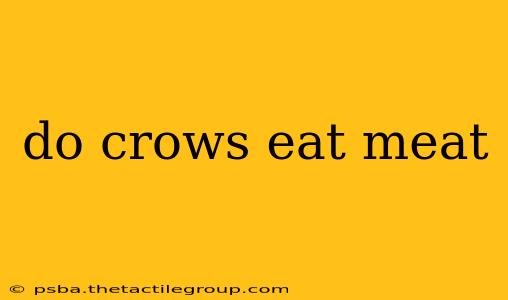Crows, those intelligent and ubiquitous birds, are often seen scavenging in urban and rural environments. But what exactly do they eat? While they're known for their opportunistic feeding habits, a common question is: do crows eat meat? The answer is a resounding yes. In fact, meat forms a significant part of their diet, showcasing their adaptability and contributing to their ecological role.
The Carnivorous Side of Crows: What Meat Do They Eat?
Crows are omnivores, meaning their diet includes both plant and animal matter. However, their carnivorous tendencies are undeniable. They're quite capable of consuming a wide variety of meat sources, including:
-
Carrion: Dead animals are a readily available food source for crows. They play a vital role as scavengers, cleaning up carcasses and preventing the spread of disease. This can range from small rodents and birds to larger animals, depending on opportunity and crow size.
-
Insects: A substantial portion of a crow's diet consists of insects, both larvae and adults. Beetles, grasshoppers, caterpillars – they're all fair game. This highlights their importance in insect population control.
-
Eggs and Nestlings: While less common, crows are known to prey on the eggs and young of other birds. This behavior is more prevalent during breeding season when crows need extra protein to support their own young.
-
Small Vertebrates: Depending on their size and location, crows might also hunt and kill small vertebrates such as mice, lizards, snakes, and even small fish. This opportunistic hunting demonstrates their intelligence and hunting prowess.
-
Human-Provided Food: In urban environments, crows are remarkably adept at exploiting human food sources. This can include discarded meat scraps, leftovers, and even pet food. This adaptability is a key factor in their success in human-dominated landscapes.
Beyond Meat: The Omnivorous Nature of the Crow's Diet
While meat plays a crucial role, it's important to remember that crows aren't exclusively carnivorous. Their diet is diverse and opportunistic, incorporating:
-
Fruits and Berries: Crows readily consume a variety of fruits and berries, depending on seasonal availability. This provides them with essential sugars and vitamins.
-
Seeds and Grains: Seeds and grains offer a valuable source of carbohydrates and energy. They're particularly important in areas where other food sources are scarce.
-
Nuts and Acorns: Similar to seeds and grains, these provide additional energy and nutrients.
-
Waste Material: As opportunistic feeders, crows will also consume human-generated waste, further demonstrating their adaptability.
The Ecological Importance of the Crow's Meat Consumption
The crow's carnivorous habits play a vital role in the ecosystem. By scavenging carrion, they prevent the buildup of decaying matter, reducing the risk of disease and promoting a cleaner environment. Their consumption of insects helps control insect populations, protecting crops and other plants.
Conclusion: Crows as Skilled Omnivores
The question "Do crows eat meat?" is answered comprehensively by their diverse and opportunistic feeding behavior. While they're omnivores with varied dietary preferences, meat, in its many forms, is an essential component of their diet, showcasing their adaptability, intelligence, and crucial role within their ecosystem. Their ability to thrive in a wide range of environments is a testament to their flexibility and remarkable survival skills.

